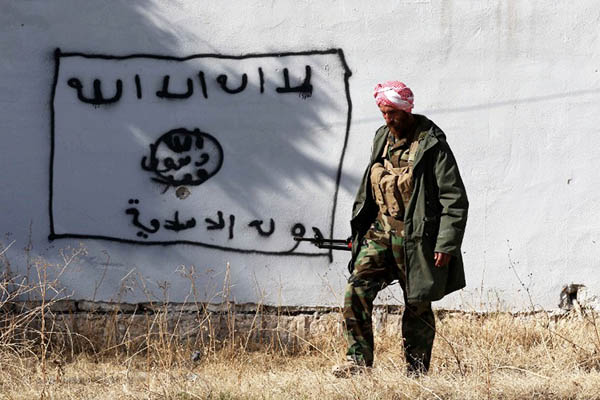
Safin Hamed—AFP
Syrian and Iraq troops are targeting militant group’s force in Palmyra, Mosul.
Syrian troops on Thursday entered the ancient city of Palmyra and Iraqi forces launched an offensive against Mosul as pressure mounted on key strongholds of the Islamic State jihadist group.
U.S. Secretary of State John Kerry meanwhile held talks with Russia’s President Vladimir Putin and agreed to push for a political settlement in the war torn country, but the future of its Moscow-allied leader Bashar al-Assad remains a sticking point. Unless Assad agrees to step down, there are concerns that the Syrian opposition could drop out of peace talks in Geneva, which U.N. envoy Staffan de Mistura said he was aiming to restart on April 9.
Backed by Russian warplanes and allied militia on the ground, the Syrian army advanced into Palmyra after launching a desert offensive early this month, said the Syrian Observatory for Human Rights.
The defense ministry in Moscow said Russian aircraft carried out 146 strikes on “terrorist targets” in the Palmyra area between Sunday and Wednesday, killing 320 “terrorists” and destroying six command posts and two ammunition dumps.
I.S. overran Palmyra—known as the “Pearl of the Desert”—last May and it has since blown up UNESCO-listed temples and looted relics that dated back thousands of years. “Regime forces have entered the Hayy al-Gharf neighborhood in the southwest of Palmyra. They are advancing very slowly because of mines planted by I.S.,” Observatory director Rami Abdel Rahman said, adding troops were also advancing from the north.
Palmyra’s recapture would be a major strategic and symbolic victory for Assad, since whoever holds it also controls the vast desert extending from central Syria to the Iraqi border.
A Syrian military source said the army had entered Palmyra from the northwest after seizing control of part of the historic Valley of the Tombs. “The clashes, which are ongoing, are fierce,” he said.
I.S. had earlier urged civilians to flee the city, where about 15,000 of its 70,000 original residents remained after the jihadist takeover.
Syria’s antiquities chief Maamoun Abdelkarim hailed the “imminent” recapture of Palmyra, vowing to rebuild monuments the jihadists destroyed. “I am so happy that the liberation is imminent… before the total destruction of the ancient city,” he said.
UNESCO chief Irinia Bokova welcomed the push to recapture Palmyra. “For one year, Palmyra has been a symbol of the cultural cleansing plaguing the Middle East,” Bokova said.
Across the border, Iraqi forces announced the start of an offensive to retake the second city of Mosul, I.S.’s main hub in Iraq.
The army and the Popular Mobilization paramilitary force “have begun the first phase of conquest operations” in the northern province of Nineveh, of which Mosul is the capital, Iraq’s joint operations command said. It said four villages had been taken between the town of Qayyarah, which is held by I.S., and Makhmur, where U.S.-backed Iraqi forces have been massing.
Experts have warned any battle to retake Mosul would be difficult, given the significant number of jihadists and civilians in the city and the time I.S. has had to prepare defenses.
At the U.S.-Russia talks in Moscow, some consensus appeared to be achieved over a framework and timeline for a political transition. “We agreed on a target schedule for establishing a framework for a political transition and also a draft constitution, and the target is August,” Kerry said at a joint news conference with Foreign Minister Sergei Lavrov after the talks.
Lavrov told journalists that Moscow and Washington would now step up efforts to get the Syrian regime and opposition to hold “direct talks” in Geneva, where a round of negotiations that saw a United Nations mediator shuttle between the delegations concluded on Thursday. But Kerry appeared to back away from comments made before the meeting that suggested he would sound out the Russian leader about pressuring his ally Assad to step aside.
“Russia will have to speak for itself as what it’s going to choose to do in order to help Mr. Assad make the right decisions,” he said.
Syria’s main opposition said the Geneva talks “laid the basis” for substantive negotiations next month, but warned any real progress depended on Russia pressuring the Assad government. “This is a unique moment, a precious moment and we hope Russia will seize this moment and use its leverage,” High Negotiations Committee spokeswoman Bassma Kodmani said.
Assad’s future has been a key obstacle in the latest talks, with the government insisting any discussion of him leaving is “excluded” and the opposition saying any talk of allowing him to stay is “absolutely unacceptable.”
